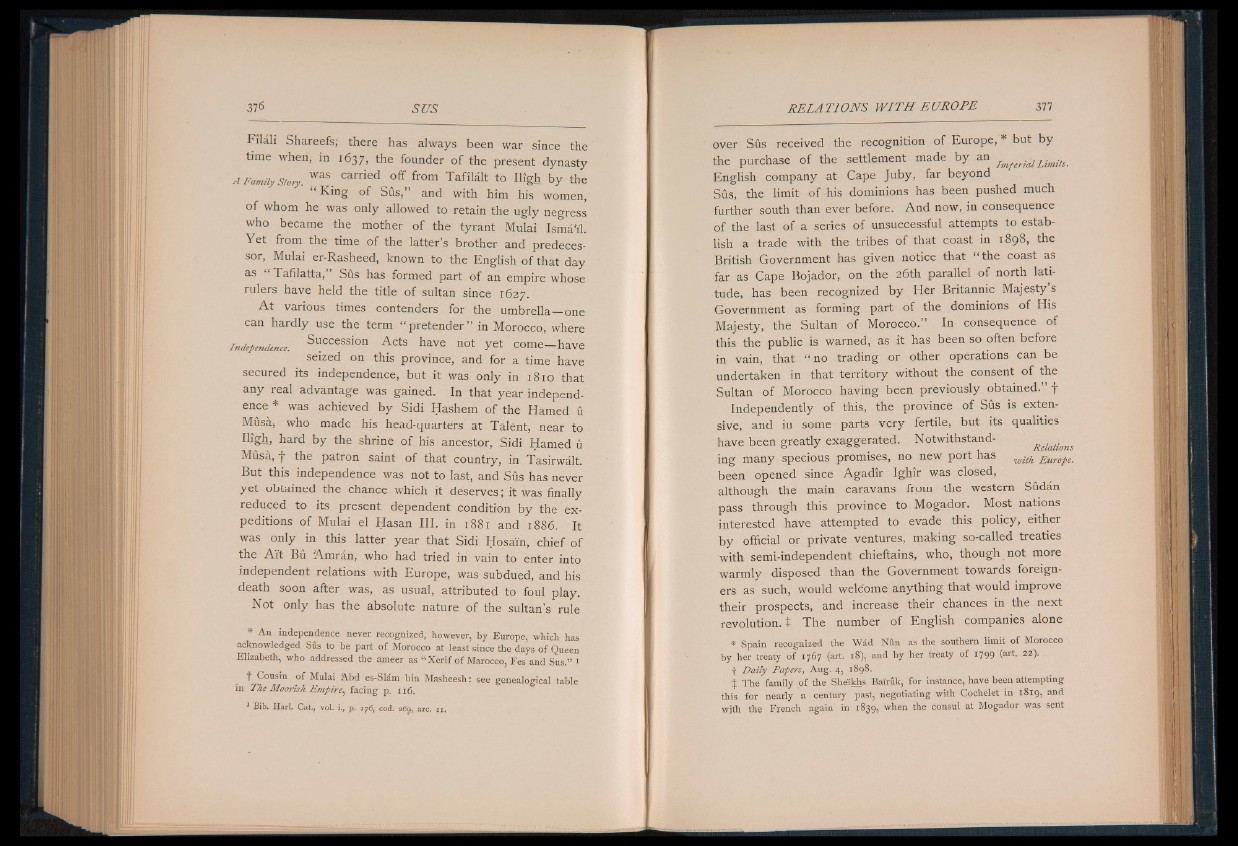
376 SUS
Filali Shareefs; there has always been war since the
time when, in 1637, the founder o f the present dynasty
A Family Story. W3\ fr°m Tafilalt to Iligh by the
King of Sus, and with him his women,
o f whom he was only allowed to retain the ugly negress
who became the mother of the tyrant Mulai Isma'il.
Y e t from the time of the latter’s brother and predecessor,
Mulai er-Rasheed, known to the English of that day
as Tafilatta, Sus has formed part of an empire whose
rulers have held the title of sultan since 1627.
A t various times contenders for the umbrella one
can hardly use the term “ pretender” in Morocco, where
Independence. Successlon Acts have not yet come— have
seized on this province, and for a time have
secured its independence, but it was only in 1810 that
any real advantage was gained. In that year independence
* was achieved by Sidi Hashem of the Hamed u
Musa, who made his head-quarters at Talent, near to
High, hard by the shrine of his ancestor, Sidi Hamed u
Musa, -j- the patron saint of that country, in Tasirwalt.
But this independence was not to last, and SuS has never
y et obtained the chance which it deserves; it was finally
reduced to its present dependent condition by the expeditions
of Mulai el Hasan III. in 1881 and 1886. It
was only in this latter year that Sidi Hosai'n, chief of
the Axt Bu Amran, who had tried in vain to enter into
independent relations with Europe, was subdued, and his
death soon after was, as usual, attributed to foul play.
Not only has the absolute nature of the sultan’s rule
* An independence never recognized, however, by Europe, which has
acknowledged Shs to be part of Morocco at least since the days of Queen
Elizabeth, who addressed the ameer as “ Xerif o f Marocco, Fes and Sus.” 1
f Cousin of Mulai Abd es-Slam bin Masheesh: see genealogical table
in The Moorish Empire^ facing p. n 6.
* Bib, Harl. Cat.; vol. i., p. x j6f cod. 269, arc. i j .
RELA TIONS W ITH EUROPE 377
over Sus received the recognition of Europe, * but by
the purchase of the settlement made by an ImferialLimits
English company at Cape Juby, far beyond
Sus, the limit of his dominions has been pushed much
further south than ever before. And now, in consequence
of the last of a series of unsuccessful attempts to establish
a trade with the tribes of that coast in 1898, the
British Government has given notice that “ the coast as
far as Cape Bojador, on the 26th parallel of north latitude,
has been recognized by Her Britannic Majesty s
Government as forming part of the dominions of His
Majesty, the Sultan of Morocco.” In consequence of
this the public is warned, as it has been so often before
in vain, that “ no trading or other operations can be
undertaken in that territory without the consent of the
Sultan of Morocco having been previously obtained.” f
Independently of this, the province of Sus is extensive,
and in some parts very fertile, but its qualities
have been greatly exaggerated. Notwithstand- delations
ing many specious promises, no new port has w itk E u rop e_
been opened since Agadir Ighir was closed,
although the main caravans from the western Sudán
pass through this province to Mogador. Most nations
interested have attempted to evade this policy, either
by official or private ventures, making so-called treaties
with semi-independent chieftains, who, though not more
warmly disposed than the Government towards foreigners
as such, would welcome anything that would improve
their prospects, and increase their chances in the next
revolution, t The number of English companies alone
* Spain recognized the Wád Non as the southern limit of Morocco
by her treaty of 1767 (art. 18), and by her treaty of 1799 (^t. 22).
f Daily Papers, Aug. 4, 1898.
£ The family of the Sheikhs Ba'iruk, for instance, have been attempting
this for nearly a century past, negotiating with Cochelet in 1819, and
with the French again in 1839, when the consul at Mogador was sent